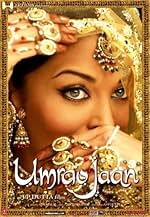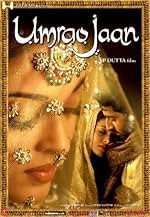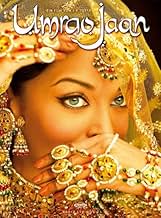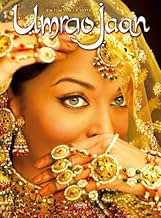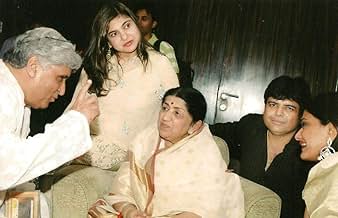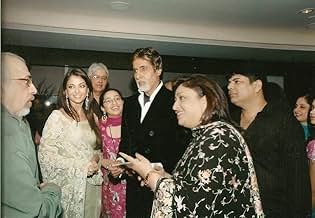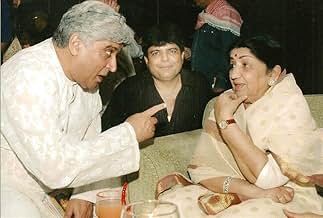Umrao Jaan
- 2006
- 3h 8min
NOTE IMDb
5,4/10
2,1 k
MA NOTE
Ajouter une intrigue dans votre langueJ.P. Dutta's adaption of the Urdu novel "Umrao Jan Ada" by Mirza Haadi Ruswa (1905).J.P. Dutta's adaption of the Urdu novel "Umrao Jan Ada" by Mirza Haadi Ruswa (1905).J.P. Dutta's adaption of the Urdu novel "Umrao Jan Ada" by Mirza Haadi Ruswa (1905).
- Réalisation
- Scénario
- Casting principal
- Récompenses
- 2 nominations au total
Aishwarya Rai Bachchan
- Ameeran
- (as Aishwariya Rai)
- …
Suniel Shetty
- Faiz Ali
- (as Suneil Shetty)
Puru Rajkumar
- Gauhar Mirza
- (as Puru Raj Kumar)
Vishwajeet Pradhan
- Dilawar Khan
- (as Viswajeet Pradhan)
Javed Khan Amrohi
- Pir Baksh
- (as Javed Khan)
Avis à la une
Overall its a good movie especially if you enjoy watching old classics again. The first half of the movie was very disappointing. The acting was not up to the par and dialog didn't flow smoothly. Too many songs and some of the conversations were little too long. They could have easily edited those long scenes to make it shorter and more appealing. The second half was great ! The story line picks up, there is more going on than just lovey dubbey conversations and songs between Umaro and Nawab as was the case in the first half. I think Aish acted really well and as always she looked great with those costumes, jewelery and expressive eyes.
I happened to watch original Umrao Jann just a few days back by chance and instantly fell for classic movies. As soon as this remake was released i went especially to theater to watch and i didn't regret as it was equally good. Story was not completely a copy of original one ,instead some more good ideas were added. I think it wont be fair to both REKHA and ASH to compare them with each other as both performed equally well and were a perfect choice for the character as it demanded some thing beyond than just the verbal performance. Songs are really touchy esp SALAAM and JIS ZINDAGE NAY AP SE MILWA DIYA HAMAIN. Though the duration of the movie is too long for the typical Indian movie (which is the only not-so-good aspect to some extent) but if considered it was inevitable for such a story. Its not that Abhishak didn't perform well, he did an OK job, its just that he doesn't have the typical NAWAB FEATURES, or may b we are looking forward to his upcoming DHOOM 2 featuring him as the cool cop, so perhaps having that image in mind i just couldn't digest him playing a NAWAB in this movie. Rest the sets were good and the costumes too, though the dialogs if written with more depth would have added more to it. Anyway overall everybody did a good job. And one last thing,even if the movie didn't do well on box office, Ash should get best actress award this year. What do u say??
Poor Aishwariya Rai. To have had to suffer the indignity of being "the most beautiful woman in the world." It may sound like I'm being excessively sarcastic, but you're only half right. Rai, like many other actors before her, has had to contend with preconceived notions of her artistic abilities. What makes her unique is that she has also had to contend with the very thing which has brought her so much international attention: her looks.
Unlike India's other major screen mavens renowned for their beauty (Madhubala, Rekha, and Manisha Koirala among them) Rai's ethereal charms have consistently been lodged against her as proof that she is nothing but a plastic mannequin with the emotional range of a Barbie Doll. And until recently, her detractors have largely been right.
Bhansalli's "Hum Dil Dechuke Sanam," for all its puerility, showed that Rai deserved the title of "performer," if not "actress." His follow-up, the heinous melodramatic bloat called "Devdas," gave a glimpse into what was possible for Rai under the right set-up: she was, and remains, the only thing worth watching in a film that should have been called, "Paro." And now "Umrao Jaan" finally brings the inner being out which pronounces the arrival of Aishwariya Rai "the actress." While one may question J.P. Dutta's motives for filming a story already memorialized as a classic, one does not question his casting of the lead. As Ameeran/Umrao Jaan, Aishwariya at last achieves that elusive but indispensable acting necessity: emotional nudity. Regardless of whether one agrees with the film or the character, she cannot be faulted for turning in a hollow, soulless, or canned performance. Here she is fully in character, physically, aesthetically, emotionallyeven psychologically. And while the film is melodramatic, Rai is decidedly not. She delivers the superficial necessities of the eponymous courtesanbreathtaking beauty and grace, and dances which are embodiments of bothbut her performance is never subdued by the surface features of Umrao Jaan. Witness the scene in which she is repudiated by her aristocratic lover in his drunken stupor: the dual conjuring of disbelief and anger as she spits out the refrain, "Vah Re, Kismat" ("Oh, Fate.") is perfect in its subtlety. Barely moving her lips to deliver the curse of her fate, Rai demonstrates that she is capable of much more than is customarily delegated her way.
The film features a few lightweight actors, like Sunil Shetty, who is woefully wooden and miscast. One cannot help but pine for a menacing Shah Rukh Khan or a grunting Abhishek Bachchan in the part of Faiz Ali. Bachchan is, of course, present as Nawab Sultan, Umrao Jaan's only true love. Sadly, he delivers an uninspired portrayal of an aristocrat tormented by his desire for a courtesan. Dutta's casting is way off here as well. Sultan is frankly the kind of part screaming to be played by Ajay Devegan or Akshaye Khanna.
Much has been made of the fact that Shabana Azmi is playing the part of brothel keeper which her mother played in the 1981 film. Unfortunately, Dutta conceptualizes the part from a much more clichéd stock "mother" stereotype which lacks the bite and deformed morality which made the original so interesting. Perhaps a Rekha or Sridevi would have made the part more deliciously dramatic, making this a film about the forging and destroying of female bonds in a misogynistic world, rather than a romanticized portrayal of prostitution which ignores the fundamental questions of a woman-identified sanctuary for women in 19th century India. We'll have to wait until the story is absorbed by experimental feminist cinemaoddly enough, Muzaffar Ali's film deals with these issues rather lucidly. One thing I'd love to see is an adaptation by a female director- Mira Nair or Deepa Mehta could work unique wonders with such a story.
But back to Dutta. The main drawback of his film is its script. It is constructed as a chaptered retelling of the life of Umrao Jaan who recounts her memorable journey to the man who would later memorialize her in print. The film revolves around a ho-hum love story thrown on top of an absolutely awful introduction in which the kidnapped Ameeran inexplicably accepts her place in the brothel because it offers her material opulence. How many sheltered 10-year-old girls will accept the position of prostitute-in-training? Not many, I'm glad to say, but Dutta's film explains away the young victim's angst or torment as though she had been peddled off for a day at a carnival. Whatever the realities of life were for 19th century working class girls, the flippant caricature offered by Dutta was most definitely not it.
Comparisons between Dutta's and Ali's films are difficult to maintain, yet unavoidable. The plot/characterizations are sufficiently different, yet one cannot help but think of the peerless Rekha as Umrao Jaan. Despite Rai's earnest performance, designer costumes, and modernized mujras, Rekha continues to literally own Umrao Jaan. Few scenes can compare to Rekha's wordless devastation in the moment her lover has come to invite her to his wedding. Her longing, yearning, and rage all rally in her eyes as angry tears and she tears away Sultan's shirt without revealing the heart she longed to conquer. Not a single moment in Dutta's film approaches the depth of this scene, and so Dutta will have to settle for the embrace of the moment, if not of history.
The same holds for the film's music: Anu Malik's compositions are fine works of music, no doubt, but there are frankly too many of them and offer little range. Javed Akhtar's lyrics, however, deserve special mention, particularly the final lament "Poochrahe Hain Poochnewale." The final stanza of "Patthar Ab Kya Phenk Raheho, Hum Pehlese Zakhmi Hain" (Why do you cast your stones when I am already wounded?) bespeaks the brilliance that *should* have been. Alas.
And so the final word is that Aishwariya is a revelation, but the film tells us something we already know: a classic cannot be remade.
Unlike India's other major screen mavens renowned for their beauty (Madhubala, Rekha, and Manisha Koirala among them) Rai's ethereal charms have consistently been lodged against her as proof that she is nothing but a plastic mannequin with the emotional range of a Barbie Doll. And until recently, her detractors have largely been right.
Bhansalli's "Hum Dil Dechuke Sanam," for all its puerility, showed that Rai deserved the title of "performer," if not "actress." His follow-up, the heinous melodramatic bloat called "Devdas," gave a glimpse into what was possible for Rai under the right set-up: she was, and remains, the only thing worth watching in a film that should have been called, "Paro." And now "Umrao Jaan" finally brings the inner being out which pronounces the arrival of Aishwariya Rai "the actress." While one may question J.P. Dutta's motives for filming a story already memorialized as a classic, one does not question his casting of the lead. As Ameeran/Umrao Jaan, Aishwariya at last achieves that elusive but indispensable acting necessity: emotional nudity. Regardless of whether one agrees with the film or the character, she cannot be faulted for turning in a hollow, soulless, or canned performance. Here she is fully in character, physically, aesthetically, emotionallyeven psychologically. And while the film is melodramatic, Rai is decidedly not. She delivers the superficial necessities of the eponymous courtesanbreathtaking beauty and grace, and dances which are embodiments of bothbut her performance is never subdued by the surface features of Umrao Jaan. Witness the scene in which she is repudiated by her aristocratic lover in his drunken stupor: the dual conjuring of disbelief and anger as she spits out the refrain, "Vah Re, Kismat" ("Oh, Fate.") is perfect in its subtlety. Barely moving her lips to deliver the curse of her fate, Rai demonstrates that she is capable of much more than is customarily delegated her way.
The film features a few lightweight actors, like Sunil Shetty, who is woefully wooden and miscast. One cannot help but pine for a menacing Shah Rukh Khan or a grunting Abhishek Bachchan in the part of Faiz Ali. Bachchan is, of course, present as Nawab Sultan, Umrao Jaan's only true love. Sadly, he delivers an uninspired portrayal of an aristocrat tormented by his desire for a courtesan. Dutta's casting is way off here as well. Sultan is frankly the kind of part screaming to be played by Ajay Devegan or Akshaye Khanna.
Much has been made of the fact that Shabana Azmi is playing the part of brothel keeper which her mother played in the 1981 film. Unfortunately, Dutta conceptualizes the part from a much more clichéd stock "mother" stereotype which lacks the bite and deformed morality which made the original so interesting. Perhaps a Rekha or Sridevi would have made the part more deliciously dramatic, making this a film about the forging and destroying of female bonds in a misogynistic world, rather than a romanticized portrayal of prostitution which ignores the fundamental questions of a woman-identified sanctuary for women in 19th century India. We'll have to wait until the story is absorbed by experimental feminist cinemaoddly enough, Muzaffar Ali's film deals with these issues rather lucidly. One thing I'd love to see is an adaptation by a female director- Mira Nair or Deepa Mehta could work unique wonders with such a story.
But back to Dutta. The main drawback of his film is its script. It is constructed as a chaptered retelling of the life of Umrao Jaan who recounts her memorable journey to the man who would later memorialize her in print. The film revolves around a ho-hum love story thrown on top of an absolutely awful introduction in which the kidnapped Ameeran inexplicably accepts her place in the brothel because it offers her material opulence. How many sheltered 10-year-old girls will accept the position of prostitute-in-training? Not many, I'm glad to say, but Dutta's film explains away the young victim's angst or torment as though she had been peddled off for a day at a carnival. Whatever the realities of life were for 19th century working class girls, the flippant caricature offered by Dutta was most definitely not it.
Comparisons between Dutta's and Ali's films are difficult to maintain, yet unavoidable. The plot/characterizations are sufficiently different, yet one cannot help but think of the peerless Rekha as Umrao Jaan. Despite Rai's earnest performance, designer costumes, and modernized mujras, Rekha continues to literally own Umrao Jaan. Few scenes can compare to Rekha's wordless devastation in the moment her lover has come to invite her to his wedding. Her longing, yearning, and rage all rally in her eyes as angry tears and she tears away Sultan's shirt without revealing the heart she longed to conquer. Not a single moment in Dutta's film approaches the depth of this scene, and so Dutta will have to settle for the embrace of the moment, if not of history.
The same holds for the film's music: Anu Malik's compositions are fine works of music, no doubt, but there are frankly too many of them and offer little range. Javed Akhtar's lyrics, however, deserve special mention, particularly the final lament "Poochrahe Hain Poochnewale." The final stanza of "Patthar Ab Kya Phenk Raheho, Hum Pehlese Zakhmi Hain" (Why do you cast your stones when I am already wounded?) bespeaks the brilliance that *should* have been. Alas.
And so the final word is that Aishwariya is a revelation, but the film tells us something we already know: a classic cannot be remade.
Muzaffar Ali made the classic "Umrao Jaan" in 1981 starring Rekha, Farooq Sheikh, Naseeruddin Shah, and Raj Babbar. Compared to that, this one is entirely unwatchable.
The screenplay is terrible and barely maintains the viewer's interest for the first hour. Only towards the end is there any noticeable flow to the story. Casting is fine, but Sunil Shetty does not fit the bill of Faiz Ali.
The language of Lucknow is Urdu, and, unlike what some other commentators claim, the movie does not employ a correct version of the language. The dialect used by some characters is also incorrect. Dialogues are horrible, and Aishwarya's pronunciation of Urdu words is absolutely revolting. Umrao Jaan was an Urdu poetess, and Aishwarya does not do her justice. The playback singers, however, are excellent, especially Alka Yagnik.
Being a native of Lucknow, I know that we do not use "Baisa", "Mausa", "Apshagun", "Maan maryada" etc, especially among Muslim families, to which all the movie's characters belong. Yet, JP Dutta pays no attention to these important details, and the characters continue to use these and other wrong terms.
The characters' wardrobe is not comparable to period Lucknow or to Muzaffar Ali's version of the movie, despite Abu Jani and Sandeep Khosla's involvement.
JP Dutta's Umrao Jaan is a low budget pretender of a movie, with Aishwarya's looks being the only redeeming factor.
Stay away from this film. Watch Muzaffar Ali's original version, if you can. That was a pleasure to watch.
2/10.
The screenplay is terrible and barely maintains the viewer's interest for the first hour. Only towards the end is there any noticeable flow to the story. Casting is fine, but Sunil Shetty does not fit the bill of Faiz Ali.
The language of Lucknow is Urdu, and, unlike what some other commentators claim, the movie does not employ a correct version of the language. The dialect used by some characters is also incorrect. Dialogues are horrible, and Aishwarya's pronunciation of Urdu words is absolutely revolting. Umrao Jaan was an Urdu poetess, and Aishwarya does not do her justice. The playback singers, however, are excellent, especially Alka Yagnik.
Being a native of Lucknow, I know that we do not use "Baisa", "Mausa", "Apshagun", "Maan maryada" etc, especially among Muslim families, to which all the movie's characters belong. Yet, JP Dutta pays no attention to these important details, and the characters continue to use these and other wrong terms.
The characters' wardrobe is not comparable to period Lucknow or to Muzaffar Ali's version of the movie, despite Abu Jani and Sandeep Khosla's involvement.
JP Dutta's Umrao Jaan is a low budget pretender of a movie, with Aishwarya's looks being the only redeeming factor.
Stay away from this film. Watch Muzaffar Ali's original version, if you can. That was a pleasure to watch.
2/10.
Despite being panned, I had hope that this film might be a fulfilling experience. The main problem with 'Umrao Jaan' is that it insists upon itself. It tries hard to be taken seriously, ergo, the script seems to be written by an eight grader who has just received a thesaurus and tries to impress his teacher by resorting to complex Lexis where simple words would do. Fact: J.P Dutta's version had all the makings of a grand tragedy: the ethereal main lead, her ashenly handsome love interest, haunting songs and magnificent sets and costumes.
Furthermore,the length of the film is exhaustive...I actually had to get up and move about for a bit in order to shake the cobwebs lining the inside of my cranium. The songs, though melodiously rendered, are far too many in number and get on one's nerves after a while. Also Dutta has shown 'Umrao Jaan' to be a love story gone sour. Having read Rusva's original I can safely say that the broad outlook of the novel was to provide the reader an insight into the life of a courtesan...the love story was just a part of the text and not the novel as a whole.
In conclusion, Umrao Jaan may be Aishwarya Rai's most powerful work till date and another feather in Shabana Azmi's cap but it is vaguely reminiscent of 'Memoirs of a Geisha' sans a true sense of tragedy.
Furthermore,the length of the film is exhaustive...I actually had to get up and move about for a bit in order to shake the cobwebs lining the inside of my cranium. The songs, though melodiously rendered, are far too many in number and get on one's nerves after a while. Also Dutta has shown 'Umrao Jaan' to be a love story gone sour. Having read Rusva's original I can safely say that the broad outlook of the novel was to provide the reader an insight into the life of a courtesan...the love story was just a part of the text and not the novel as a whole.
In conclusion, Umrao Jaan may be Aishwarya Rai's most powerful work till date and another feather in Shabana Azmi's cap but it is vaguely reminiscent of 'Memoirs of a Geisha' sans a true sense of tragedy.
Le saviez-vous
- AnecdotesAll of the jewelry worn in the movie was real.
- GaffesThe movie is set in the period of the late 19th century but the hand pump shown is of India Mark II which came into existence much later.
- ConnexionsVersion of Umrao Jaan (1981)
- Bandes originalesEk Toote Hue Dil Ki
Written by Javed Akhtar
Music by Anu Malik
Performed by Alka Yagnik
Courtesy of T-series
Meilleurs choix
Connectez-vous pour évaluer et suivre la liste de favoris afin de recevoir des recommandations personnalisées
- How long is Umrao Jaan?Alimenté par Alexa
Détails
- Date de sortie
- Pays d’origine
- Site officiel
- Langues
- Aussi connu sous le nom de
- Красавица Лакнау
- Lieux de tournage
- Voir plus de crédits d'entreprise sur IMDbPro
Box-office
- Montant brut aux États-Unis et au Canada
- 485 000 $US
- Week-end de sortie aux États-Unis et au Canada
- 485 000 $US
- 5 nov. 2006
- Montant brut mondial
- 1 371 723 $US
- Durée
- 3h 8min(188 min)
- Couleur
Contribuer à cette page
Suggérer une modification ou ajouter du contenu manquant

